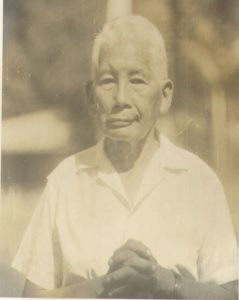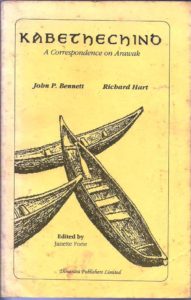By Petamber Persaud
Though blind, John Peter Bennett continued to work on his typewriter to produce seminal work on the indigenous Arawak people. Bennett was a man who loved books, reading and writing; a man who rewarded good work with more work.

Bennett was a teacher, priest, educator, linguist, translator, writer and more. He was the first indigenous person to be ordained as an Anglican priest in Guyana; the first indigenous person to be canonised in the Anglican Church of Guyana; and the first indigenous person to write and publish “An Arawak-English Dictionary”.
Early life
John Peter Bennett was born in 1914 in Kabakaburi on the Pomeroon River. He died in 2011, in the same village in which he was born, after living a fruitful life.
At an early age, Bennett knew something was wrong when students were flogged for speaking their native tongue. He knew something was wrong when speaking their native language in school was discouraged. He knew this was wrong since he learned much and understood more when his father spoke to him in Lokono – his first language. This realisation manifested itself in making Bennett a linguist, translator and author.
Bennett’s formal education ended when he was about the age of 12. But he furthered his education through reading, perhaps encountering Mark Twain’s “[d]on’t let schooling interfere with your education”. In this respect, the library of an Anglican priest, Reverend Martin B. Hirst was of enormous help to him.
One of his skill trainings came to his aid in a world where there were few opportunities available to a thinker and enterprising young man. As a tailor, Bennett knew how to cut his coat according to his cloth. He didn’t allow blindness and partial paralysis prevent him from doing his lifework as he tapped away long hours at his typewriter. And he didn’t miss out on reading; his grandchildren were ready and willing to read to him.
In 1940, Bennett married Clara James and the union produced a boy, Maurice, and a girl, Jennifer. Their first daughter died in infancy. Even with a family to provide for, he pursued his dreams in service to his people. For this, he had to equip himself with the necessary tools. He attended Codrington College in Barbados to train for the priesthood. After ordination, he served as priest in several parishes across Guyana. Later, he was made canon of the Anglican Church. 
In 1989, Bennett was awarded The Golden Arrow of Achievement (A.A.) by the Government of Guyana. In September 2015, the National Art Gallery in collaboration with the Ministry of Indigenous Peoples’ Affairs paid homage to Bennett by mounting an exhibition of artwork by indigenous artists.
A granddaughter’s memories
Below is an extract of an interview with Dr Viviane Baharally (VB), a granddaughter of John Peter Bennett, Georgetown, Guyana, October 2015:
PP (Petamber Persaud): Concerning your grandfather, John Peter Bennett, there are a number of things you touched on – reading, writing, storytelling… His writing led to a significant pen pal relationship with Richard Hart, which resulted in the publication of the book “Kabethechino”.
Let’s, for a moment, look at his correspondence with Richard Hart.
VB: The most I know about those correspondences was me collecting bundles and bundles of letters from the school where there were left for us to retrieve. After a time, I use to leave my basket at the school because they were so many… But I must say I never really had a look at any.
This book is out of print, and now because of that, I will be encouraged to read them.
PP: I want to now raise something very important. In this biography, it is said he was puzzled by the fact that students were not allowed to use their first language in school. And this led him to work on the Arawak language, which resulted in another publication, “The Arawak English Dictionary”. You did a lot of typing for him, so you are familiar with the contents of his writing…
VB: I just did the typing; I do not know Arawak…
PP: That’s why he wrote “‘The Arawak English Dictionary”…
VB: But, there is no excuse for not knowing. At that time of growing up, we didn’t see it as important…
PP: That is why you and your contemporaries, who now know of the importance of the work, should be responsible of passing this knowledge – a language is vital to a people and it should not be allowed to die.
Not long ago, Vernon Cheong performed his poetry, one of which decries the loss of the Amerindian way of life. And more than a decade ago, Uncle Basil [Basil Rodrigues] performed his poem, ‘A Merry Indian No More’…
What I’m getting at is that we are more enlightened now; that, coupled with advanced technology, would make it easy to continue the work of this remarkable man.
Some things I can’t get out of my mind about this remarkable man, like he was not only a consumer of books, but was also a producer of books.
There are many more things in the life of this remarkable man… he was an inspiration to anyone who knew him, especially to the people of Kabakaburi village… and we should remember him as a man who was not ashamed of his language and his culture…
VB: When I said I was ‘ashamed’, it was not of the language or the culture, it was of not knowing the language. There was no excuse for it…
PP: But it is never too late to do something to ensure the language isn’t lost.
The achievements of John Peter Bennett cannot be easily measured as his legacy lives on, inspiring others to safeguard our national patrimony.
Responses to this author telephone (592) 226-0065 or email: oraltradition2002@yahoo.com



